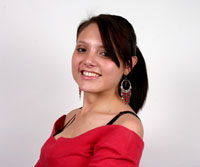By Andrea Huls
Her body lay on the elevator floor, three bullets to her head. Now, Russia mourns her death.
On Oct. 7, journalist Anna Politkovskaya was murdered after returning home from grocery shopping. The death of this journalist might not seem important to some, but to me, her death is a loss for the whole world. Politkovskaya was a warrior. She fought against inequality and injustice. She was one of the few journalists brave enough to confront Putin’s government and expose the killings, abuses, kidnappings and other horrors experienced by people in Chechnya.
According to MSNBC, her editors at the Novaya Gazeta newspaper say that she was working on a story about human rights abuses in the southern part of Chechnya. This area has been struggling with an ongoing battle between government and separatist rebels. Even though her polemical reporting was given coverage internationally, the Russian media gave her very little airtime. In a nation with 140 million people, the Novaya Gazeta has a circulation of 171,000. Most Russians obtain their information from television channels and not so much from newspapers. Television networks are controlled by the Kremlin.
Her death made me think of how fortunate I am to study journalism in a nation that protects freedom of the press. I come from Bolivia, a country of dictatorships and political turmoil. A country where media bias is not unusual and corruption is the order of the day. During the 80s my dad used to contribute to a leftist newspaper with opinion pieces. He was harsh on the government, but he never used his real name. Since then, things have changed and the level of censorship is not nearly what it used to be. However, Bolivia deals with a high level of illiteracy and there is still much that needs to be done for journalism.
I look around me and I think that many people take freedom of expression and their right to know for granted. I do not think the majority of people realize that in many countries speaking up means torture, exile or death. In countries like the Philippines, Colombia, Russia and Bangladesh, reporters are constantly threatened or murdered.
Sometimes, it is very frustrating when I talk to people who just do not care to know what is happening in the world. Is it really that difficult to read or watch the news for a little while? People complain that they do not have time. But, who has time after watching “Desperate Housewives,” playing PlayStation, or reading In-Touch to learn that Lindsey Lohan broke a nail? Really, who has time to read or watch things that actually matter?
I do not mean to attack anyone. This is my opinion, and I see things from my own perspective. I believe in making a difference, and I believe that in order to make a difference you first have to be aware of what is going on in your community, in your country and in the world. Sometimes you have to see beyond the tip of your nose. Sometimes it is necessary to get out of your little box, because the world does not revolve around you.
Politkovskaya has inspired me. She said in an interview, “I love my life, because I know it can end in any moment.” Her work as a journalist has been recognized internationally, but more importantly, she has made a difference for the people in Chechnya.
Journalism is the key to democracy. Journalists risk their own lives to serve the public and they provide society with the truth, the facts, and knowledge. Ignorance keeps the people oppressed and controlled, and in many countries censorship is the way to keep people living in ignorance.
I just think it is time that we begin to care a little more about the news, and appreciate a little more the privilege of freedom of expression.



Be the first to comment on "Not every country has free speech"